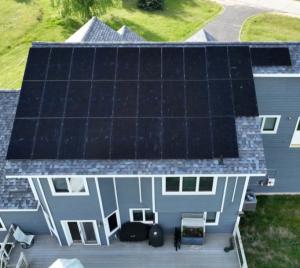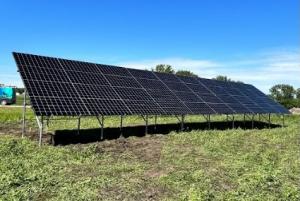
Wolf River Electric Opposes SF 1142 and HF 845, Citing Risks to Local Solar Adoption
ISANTI, MN, UNITED STATES, February 21, 2025 /EINPresswire.com/ -- Wolf River Electric has announced its strong opposition to Senate File 1142 (SF 1142) and House File 845 (HF 845), newly introduced bills in the Minnesota Legislature that seek to modify the state’s net energy metering (NEM) policies. The proposed changes could negatively impact homeowners and small businesses considering investments in solar energy, undermining Minnesota’s clean energy progress and shifting financial burdens onto local energy producers.
The bills propose redefining key terms, adjusting compensation structures, and updating interconnection standards—changes that Wolf River Electric believes will discourage solar adoption and hinder Minnesota’s ability to meet its clean energy goals. With Minnesota targeting 100% carbon-free electricity by 2040 and a net-zero economy by 2050, weakening NEM policies could slow progress toward these ambitious objectives.
"Net metering is a crucial policy that allows homeowners and small businesses to offset their energy consumption with solar power. These bills threaten to reduce compensation for solar producers, maintain high grid access fees, and create unnecessary barriers for those investing in clean energy," said Vladimir Marchenko, representative of Wolf River Electric.
Key Concerns with SF 1142 and HF 845:
• Shift from Average Retail Rate to Avoided Cost Compensation: The proposed legislation would change the compensation for excess energy supplied to the grid from the average retail rate to the avoided cost rate. This adjustment means that even customers who generate over 100% of their energy needs might still incur significant utility bills, as the excess energy they produce would be bought back by the utility at a fraction of the retail rate at the end of the year. Such a change could deter potential solar adopters, especially in areas served by cooperatives and municipal utilities with already high fixed monthly fees.
• Meter Aggregation Limitations: Currently, investor-owned utilities in Minnesota are required to offer meter aggregation, allowing customers to offset usage across multiple meters on contiguous properties they own. However, cooperatives and municipal utilities are not obligated to provide this option. As a result, rural property owners served by these utilities may need to install separate solar systems for each meter, rather than a single system to offset usage across all meters. This change could significantly increase installation costs and complexity for rural customers.
• Excessive Grid Access Fees: Many utilities, particularly cooperatives and municipal entities, impose grid access fees on solar customers. These fees can add up to $60 per month in fixed costs for maintaining a solar connection to the grid and are only charged to solar homeowners. The fees are often justified using a cost-of-service approach compliant with Minnesota Statute 216B.164 Subdivision 3(a), which considers factors such as the true cost of serving a member, the kilowatt-hour rate, and the current fixed charge. These fees were acceptable before, as homeowners could offset them with extra generation. However, under the new statute provisions, if adopted, homeowners will be left with a utility bill even if their solar system generates over 100% of their annual consumption.
• Inadequate Compensation for Excess Energy: Cooperatives and municipal utilities want to compensate excess energy sent to the grid at the avoided cost rate, typically around 2-3 cents per kilowatt-hour (kWh). This rate is significantly lower than the retail rate of 12-14 cents per kWh that other members pay for the solar energy once it leaves the solar homeowner's meter and is sold to their neighbors. Additionally, energy purchased from private producers or developers is often acquired at approximately 6 cents per kWh. This discrepancy raises concerns about fairness, as members of the cooperative and municipal utilities would be compensated less and treated worse than large corporate generators. Under this bill, solar customers receive minimal compensation for their contributions to the grid, while utilities benefit from reselling the energy at higher retail rates.
• Potential Cost Shift Misconceptions: Proponents of the bills argue that net metering increases costs for non-solar customers, yet this claim overlooks the broader benefits of rooftop solar, such as reducing peak demand, lowering transmission costs, producing energy locally, and delaying expensive grid upgrades. Studies show that, in many cases, net metering does not lead to cost shifts for non-solar customers. In fact, certain studies indicate that the true value of exported solar energy lies somewhere around 10 cents per kWh, and even the wholesale rate is 6 cents per kWh, at which utilities currently purchase electricity. Advocating to pay only 2 cents per kWh for electricity supplied by their own members is unfair to their own members.
• Impact on Local Energy Independence: Minnesota currently imports about 10% of its electricity from other states and Canada. Discouraging local solar farming is a move in the wrong direction that benefits corporate and private energy producers. These bills will increase reliance on external energy sources rather than building resilience through distributed energy generation. This bill would punish the smallest of power generators.
• Unjustified Revenue Shifts: The Minnesota Public Utilities Commission (PUC) has previously rejected over $1.7 billion in proposed rate increases, indicating that utilities may overstate cost burdens. The proposed changes could allow cooperatives and municipal utilities to purchase excess solar energy at reduced rates and resell it at full retail prices, further discouraging solar investments.
Wolf River Electric urges lawmakers to reject SF 1142 and HF 845 and instead conduct a cost-of-service study to assess the actual financial impact of retail rate net metering and current solar penetration before making significant policy changes.
"We stand with homeowners, small businesses, and clean energy advocates in Minnesota to protect fair compensation for local solar producers and maintain policies that promote energy independence," Marchenko added.
The bills are currently under review by the Senate and the House. Wolf River Electric encourages stakeholders to voice their concerns and advocate for policies that support local clean energy investment and fair market access.
For more information on SF 1142 and HF 845, visit the Minnesota Legislature's official website or contact Wolf River Electric for further discussion on how these bills impact local solar customers.
About Wolf River Electric
Founded in 2014, Wolf River Electric is a 100% employee-owned renewable energy solutions provider serving Minnesota, Wisconsin, Iowa, South Dakota, and North Dakota. With a mission to make clean energy accessible and affordable, the company specializes in solar energy installations, battery storage systems, and whole-home generator setups. Backed by affiliations with top-tier brands like Tesla, Enphase, REC, Maxeon, and Generac, Wolf River Electric is committed to delivering sustainable energy solutions that save money and support a greener future.
Justin Nielsen
Wolf River Electric
+1 763-229-6662
info@wolfriverelectric.com
Visit us on social media:
Facebook
X
LinkedIn
Instagram
Distribution channels: Building & Construction Industry, Culture, Society & Lifestyle, Energy Industry, Environment, Politics
Legal Disclaimer:
EIN Presswire provides this news content "as is" without warranty of any kind. We do not accept any responsibility or liability for the accuracy, content, images, videos, licenses, completeness, legality, or reliability of the information contained in this article. If you have any complaints or copyright issues related to this article, kindly contact the author above.
Submit your press release


